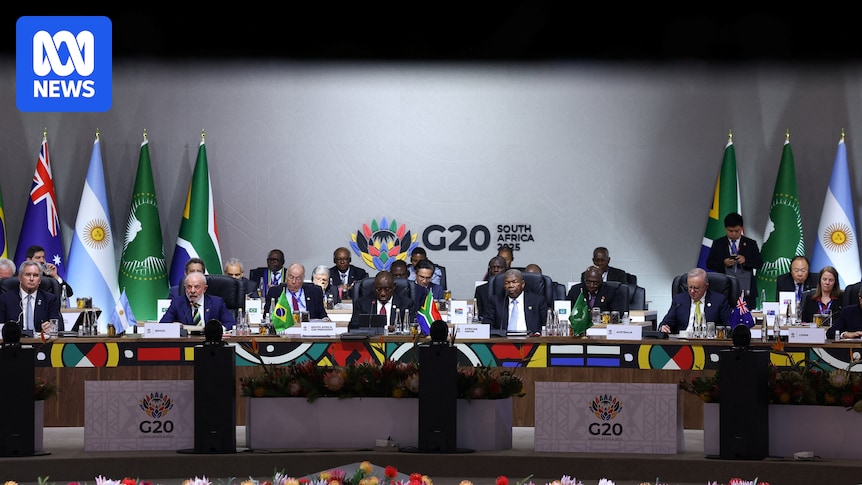G20 Leaders Unwavering: Paris Climate Agreement & Open Trade Reaffirmed, Isolating Donald Trump
 South Africa
International Politics
South Africa
International Politics

G20 leaders united in a joint statement, reinforcing commitment to the Paris climate agreement and open trade, isolating US President Donald Trump who boycotted
Global Powers Unwavering: G20 Leaders Stand United on Climate and Trade, Isolating Trump
At the recent G20 summit, leaders from the world's leading economies delivered a powerful message, effectively isolating US President Donald Trump. Despite Trump's boycott and his calls for world leaders to reject a joint declaration, the 19 participating nations, by "overwhelming consensus," adopted a robust communique. This significant document reaffirmed their collective dedication to the Paris climate agreement and championing open trade, directly countering Trump's policies and skepticism.
South Africa's President Cyril Ramaphosa, opening the summit, highlighted this unified front, emphasizing the strength of the G20 leaders' commitment. The 30-page declaration prominently features numerous references to climate change, net zero emissions, and the Paris Agreement – an accord from which the US is in the process of withdrawing, and which Trump has famously dismissed as a "hoax."
Australian Prime Minister Anthony Albanese, speaking from Johannesburg, praised the adoption of the joint statement as "a very positive sign that the world wants to get on with cooperating." Sources close to the negotiations expressed relief over the inclusion of a shared commitment to open trade, especially given Trump's efforts to reshape global trade rules to his advantage.
When questioned if the statement directly repudiated Trump's agenda, Mr. Albanese clarified that it simply reflected existing international commitments. "It's about what the world has committed to: the Paris agreement and to action on climate change," he stated, underscoring the "overwhelming support" for climate action among global leaders.
Financial Realities and Australia's Energy Stance
The G20 declaration also candidly addressed the substantial financial challenges countries face in achieving their Nationally Determined Contributions (NDCs), estimating a need of $US5.8-5.9 trillion for developing nations alone before 2030.
Domestically, the statement's embrace of "net zero" targets presents a potential challenge for Australia's Coalition government, aligning them against the world's 19 largest economies if they were in power.
Concurrently with the G20, Australia's Energy Minister Chris Bowen was in Brazil, endorsing the "Belém Declaration on the Transition Away from Fossil Fuels" at the COP30 conference. This declaration, lauded by Michael Poland of the Fossil Fuel Non-Proliferation Treaty Initiative, represents Australia's strongest language yet on phasing out fossil fuels. It calls for a roadmap to transition away from these primary drivers of greenhouse gas emissions, citing their incompatibility with limiting global temperature rise to 1.5°C.
Despite Australia's support for the Belém declaration, including its call for a fossil fuel transition roadmap, Prime Minister Albanese affirmed that gas would remain a necessary part of Australia's energy mix "through to 2050 and beyond." He argued gas provides "firming capacity" to back up renewables and asserted no existing policies would be altered to align with the declaration's ambition.
Diplomacy and Multilateralism Amidst Global Pressures
Beyond the main declaration, PM Albanese engaged in bilateral talks, including discussions with Germany's Chancellor and EU leaders to advance a free trade deal, aiming for a Q1 2026 settlement. He also accepted an invitation from Türkiye's President Recep Tayyip Erdoğan to attend next year's Anzac Day in Gallipoli, following Australia's resolution of a long-standing impasse by handing COP31 hosting rights to Türkiye for next year.
Amid concerns about the integrity of global forums, President Ramaphosa delivered a powerful closing message, urging leaders to uphold multilateralism. "Leaders have a responsibility not to allow the integrity of the G20 to be weakened, in fact it has been strengthened," he declared, concluding that "Multilateralism can and does deliver." The summit, held at the Nasrec Expo centre in Johannesburg, served as a testament to this enduring belief in collective action.